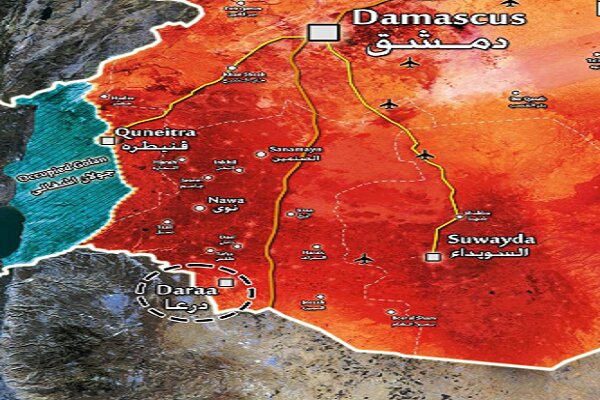Best time for US to impose normalization between Damascus and Tel Aviv

BEIRUT — During a Security Council session on Syria, U.S. Ambassador to the United Nations Dorothy Shea called on the Syrian government to take a series of political and security steps, most notably initiating talks with the Israeli entity.
The U.S. ambassador said that Washington has begun a “new era” in its relations with Syria, adding that “the United States is currently working to end the sanctions imposed on Syria.”
Shea outlined a set of demands that Damascus must adhere to in the next phase, most notably entering into talks with “Israel” to reach a “non-aggression agreement,” followed by opening the border demarcation file, presenting a clear plan regarding foreign fighters present on Syrian territory, and taking immediate measures to ban and deport armed Palestinian factions, which it described as “terrorist groups.”
Why now?!
In light of the HTS-led regime’s silence, if not complicity, Syrian airspace represents one of the most prominent areas of the U.S.-led Israeli aggression against Iran.
The ambassador’s call for Israeli-Syrian normalization coincided with Tel Aviv’s expansion of home demolitions and land clearings in large areas of the south of Syria it occupied shortly after the fall of Bashar al-Assad’s regime, along with the arrest of a number of young men.
As part of its efforts to consolidate its occupation of the areas under its control, Israeli bulldozers demolished approximately 15 homes, displacing their residents, and carried out forest clearing operations, claiming that they prevented occupation forces from clearly monitoring the occupied Syrian region.
In parallel, the Israeli army is blocking the main roads in Quneitra amid protests by residents who now live under de facto Israeli control.
The U.S. ambassador to the United Nations’ statements on Syria are a continuation of the course the United States has taken toward Syria, following the country’s neutralization from the prolonged confrontation with the Israeli enemy.
This comes amidst efforts to push Damascus to normalize relations, a goal sought by Syria’s self–appointed president, al-Julani (currently known as Ahmed al-Sharaa) and declared during a series of meetings—direct and indirect—with Israeli officials in Azerbaijan, Abu Dhabi, and elsewhere.
These meetings seek to sign a “security agreement,” through which the Israeli enemy would terminate the 1974 agreement with Damascus.
It would also annex the Syrian territories it recently occupied, bringing southern Syria completely under its control.
Washington has also withdrawn its forces from the al-Wazir and Tal Baydar bases in northeastern Syria.
It has also withdrawn 500 of the approximately 1,900 troops in Syria (distributed across seven bases and four military points) as part of a plan to reduce their number by half.
During the aforementioned Security Council session, Najat Rochdi, the Deputy Special Envoy of the UN Secretary-General for Syria, warned that Syria simply cannot afford another wave of “instability.”
Rochdi, nevertheless, did not address the ongoing Israeli attacks on Syria, including violations of Syrian airspace by intercepting Iranian missiles and drones fired against Israel in response to the regime’s illegal war against the Islamic Republic that began on June 13.
Rochdi only condemned what she considered “a serious incident in southwestern Syria, involving Israeli artillery shelling and airstrikes on military sites and weapons depots in the south, in response to a rare incident involving the launching of small rockets from Syria into the occupied Syrian Golan Heights.”
The operation was claimed by a newly established Syrian resistance faction calling itself “Uli al-Bas.”
Meanwhile, the United Nations High Commissioner for Refugees, Filippo Grandi, announced on X that “More than two million Syrian refugees and displaced persons have returned to their homes since last December, representing a sign of hope amid escalating regional tensions.”
The High Commissioner added, “This proves that we need political solutions, not another wave of instability and displacement,” pointing out that Lebanon, Syria, and UNHCR alone cannot return displaced Syrians to their country.
During his meeting with Lebanese Prime Minister Nawaf Salam, Grandi praised the plan approved by the government a few days ago regarding the return of refugees, stressing that the organization “will support it with all its strength.”
For his part, Salam expressed “the readiness of the Lebanese security services to control the Lebanese-Syrian border, regulate traffic, prevent illegal infiltration, and cooperate with the Syrian government to achieve this goal.”
Leave a Comment